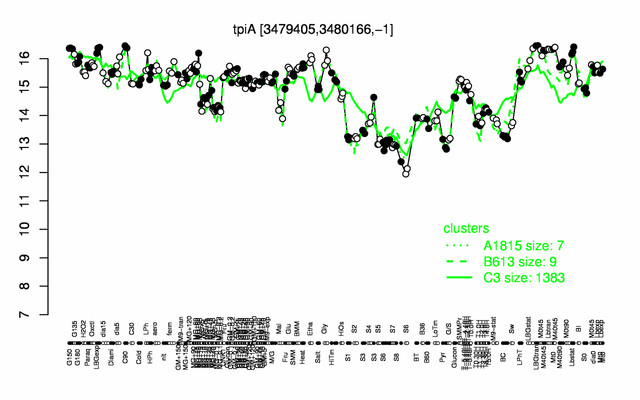Tpi
Revision as of 14:15, 17 April 2014 by 134.76.70.252 (talk)
- Description: triose phosphate isomerase, glycolytic/ gluconeogenic enzyme
| Gene name | tpi |
| Synonyms | tpiA |
| Essential | no |
| Product | triosephosphate isomerase |
| Function | enzyme in glycolysis/ gluconeogenesis |
| Gene expression levels in SubtiExpress: tpi | |
| Interactions involving this protein in SubtInteract: Tpi | |
| Metabolic function and regulation of this protein in SubtiPathways: tpi | |
| MW, pI | 26,9 kDa, 4.79 |
| Gene length, protein length | 759 bp, 253 amino acids |
| Immediate neighbours | pgm, pgk |
| Sequences | Protein DNA DNA_with_flanks |
Genetic context 
This image was kindly provided by SubtiList
| |
Expression at a glance PubMed
| |
Contents
Categories containing this gene/protein
carbon core metabolism, phosphoproteins, most abundant proteins
This gene is a member of the following regulons
The gene
Basic information
- Locus tag: BSU33920
Phenotypes of a mutant
Database entries
- BsubCyc: BSU33920
- DBTBS entry: [1]
- SubtiList entry: [2]
Additional information
- A mutation was found in this gene after evolution under relaxed selection for sporulation PubMed
The protein
Basic information/ Evolution
- Catalyzed reaction/ biological activity: D-glyceraldehyde 3-phosphate = dihydroxyacetone phosphate (according to Swiss-Prot)
- Protein family: triosephosphate isomerase family (according to Swiss-Prot)
- Paralogous protein(s):
Extended information on the protein
- Kinetic information:
- Modification: phosphorylation on Ser-213 PubMed
- Effectors of protein activity: inhibited by 2-phosphoglycolate (in B. stearothermophilus) PubMed
- Localization:
- cytoplasm PubMed
Database entries
- BsubCyc: BSU33920
- Structure: 1BTM (complex with 2-phosphoglycolic acid, Geobacillus stearothermophilus), complex with 2-phosphpoglycolic acid, Geobacillus stearothermophilus NCBI
- UniProt: P27876
- KEGG entry: [3]
- E.C. number: 5.3.1.1
Additional information
- extensive information on the structure and enzymatic properties of Tpi can be found at Proteopedia
Expression and regulation
- Regulation:
- Additional information:
- belongs to the 100 most abundant proteins PubMed
- number of protein molecules per cell (minimal medium with glucose and ammonium): 4265 PubMed
- number of protein molecules per cell (complex medium with amino acids, without glucose): 5061 PubMed
- number of protein molecules per cell (minimal medium with glucose and ammonium, exponential phase): 2920 PubMed
- number of protein molecules per cell (minimal medium with glucose and ammonium, early stationary phase after glucose exhaustion): 1493 PubMed
- number of protein molecules per cell (minimal medium with glucose and ammonium, late stationary phase after glucose exhaustion): 2091 PubMed
Biological materials
- Mutant: GP700 (cat), available in Jörg Stülke's lab, PubMed
- Expression vector:
- pGP394 (N-terminal His-tag, in pWH844), available in Jörg Stülke's lab
- pGP89 (N-terminal Strep-tag, for SPINE, expression in B. subtilis), available in Jörg Stülke's lab
- pGP1511 (expression in B. subtilis, in pBQ200), available in Jörg Stülke's lab
- lacZ fusion:
- GFP fusion:
- two-hybrid system: B. pertussis adenylate cyclase-based bacterial two hybrid system (BACTH), available in Jörg Stülke's lab
- Antibody:
Labs working on this gene/protein
Your additional remarks
References